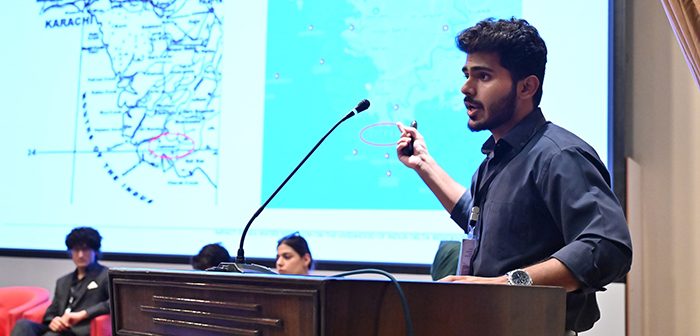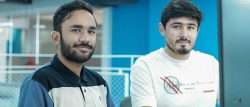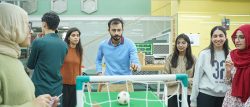Now when I think about it, it all started on a random evening a decade earlier. I was watching a news bulletin with my dad, nothing unusual. But then came a news story that caught my attention. It was about residents of the Indus Delta whose homes and lands were slowly being taken over by seawater. The visuals that I remember showed families migrating, and villages vanishing. And even though I didn’t fully understand it, it made me curious from a scientific point of view. I turned to my dad and asked, “What is happening here?” He explained that when river water stops flowing into the sea, the sea begins to push back. Well, I didn’t really get the science, but I understood that something was wrong, something I had never seen or heard about in school like most of us.
Years passed. That random evening stayed somewhere in the back of my mind, until I found myself sitting in Mr. Ashar Khan’s Qualitative Research Methods class in my fifth semester. We had to choose a topic of our choice for a literature review. And suddenly, seawater intrusion came rushing back to me. I don’t know what inspired that thought, whether it was the uniqueness of the phenomenon, the suffering of the people, or probably a will to do something for the community. However, what I really didn’t know then was that this would become the foundation of my final-year Capstone, and one of the most important projects of my undergraduate journey.
So What Even Is a Delta?
Before I go on, let me explain some important terms for the readers. I think this is the part that always makes my research presentations go beyond the time limit. A delta is the land formed where a river meets the sea. Rivers carry a lot of sediments, sand, rocks, silt — and when the river reaches the sea, the sediments get stored on the shore, forming new land. This is what built the Indus Delta.
In the past, the Indus used to flow into the sea through 17 creeks. Over 150 million acre-feet of water would pass through every year. That flow didn’t just keep the sea at bay, it created fertile land, nourished mangroves, and sustained entire communities.
But now, that flow has been choked. Barrages, canals, and upstream diversions have reduced the freshwater reaching the delta to almost nothing. And here’s the scary part: seawater is heavier than river water. So, when the freshwater disappears, seawater starts seeping back up the river, slowly invading the land. This phenomenon is called seawater intrusion — and it’s turning fertile fields into salt plains, drinking water into poison, and life into loss. I wanted to focus on how this environmental phenomenon was impacting lives in the region.
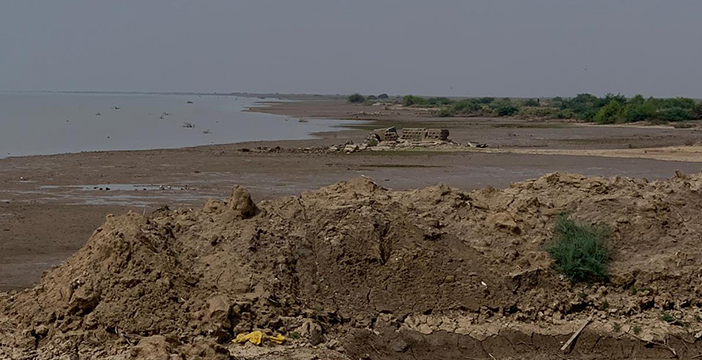
Remains of a village in Kharochanr, reduced to cracked earth and scattered ruins, slowly consumed by the advancing sea
Journey as a Researcher
For me, this entire project was a journey of exploration, not just of a topic, but of myself as a researcher. I knew I wanted to study seawater intrusion, but I didn’t know what exactly I was looking for. What should my research questions be? What angle should I take? Which aspect should I focus on? These were all questions I wondered about in the beginning. At one point, I remember joking that everything I learned in my SDP degree has somehow ended up in this paper. From qualitative analysis to quantitative regressions, from public policy frameworks to spatial mapping with QGIS, you name it, it’s all there. And honestly, none of this would have been possible without the mentors who guided me through it all.
Dr. Asad ur Rehman, my capstone advisor, was a constant source of support. Always patient, always generous with his time and feedback. I believe this was probably the best decision I made, enrolling in Dr Asad’s SRS section. Mr. Ashar and Dr. Sahaab were my lifesavers when it came to quantitative methods, helping me navigate numbers I never thought I could. And I genuinely believe one thoughtful conversation with Miss Uswa gave my research the policy clarity it was missing.
The hardest part? Without a doubt, the quantitative side of it. I had this strong urge to quantify the impact of seawater intrusion. I wanted to go beyond just describing the problem, I wanted to statistically measure how it was affecting people’s livelihoods. But finding usable data was the toughest task. And once I had some, coming up with the right model to work with it was an even bigger challenge. I literally tried regressing everything against everything, coming up with new equations every time. I’d experiment, fail, tweak, and try again. But eventually, it paid off. I was able to demonstrate a 15% negative impact on livelihoods directly linked to seawater intrusion. This differentiated my research from the previous work on the subject.
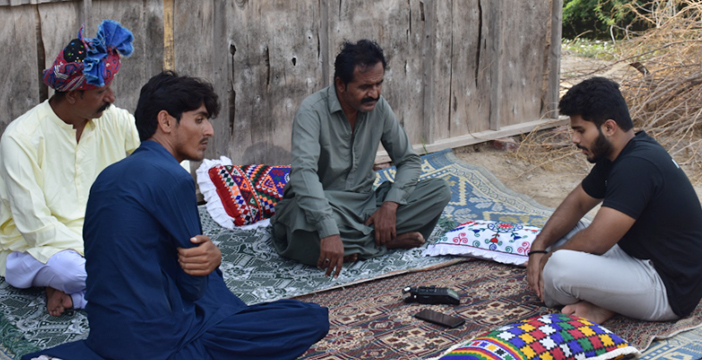
Listening to the Stories of Lost Lands.
Journey to the Delta
The fun part of SDP research is you get to travel a lot. Well, so did I. Along with some of my friends, I took the coastal highway from Karachi, down to Kharochan and Keti Bandar in the Indus Delta. Because I wanted to see everything firsthand and record people’s experiences. The journey was beautiful but heartbreaking. We stood in places that used to be people’s homes — now completely underwater. We saw graveyards flooded with seawater. Land that once grew rice and vegetables was now barren and white with salt. We met people who talked about the past like it was another lifetime, when they were farmers, fishermen, caretakers of a rich and fertile land. And then they told us how they kept migrating, hoping to escape the sea, but it always followed.
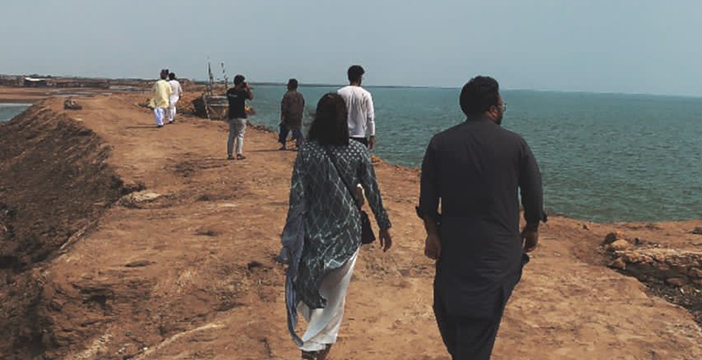
Walking towards the edge of the Indus Delta, where land meets the rising sea.
More than a Research
This research was supposed to be for my capstone. But by the time I finished, I knew this wasn’t going to end with a grade or a title. Because this isn’t just a research topic. It’s a story of survival, of people holding onto what’s left of their land, their memories, and their history. And if we don’t act now or speak up, advocate and push for better policies — we risk losing more than just a delta. We lose a rich piece of our history too.
Maybe that journey started with a random news bulletin for me. But it continues now, in every conversation, every time I hear someone say, “I didn’t know this was happening.”
Now you do.
About the Writer
Fida Hussain is a Social Development and Policy graduate from the Class of 2025, currently working as a development professional with a focus on climate resilience and public policy. His work centers on environmental justice, with a particular commitment to advancing equitable water policy and crafting sustainable, community-driven solutions. Passionate about translating local challenges into actionable policy frameworks, Fida brings a grounded, systems-oriented approach to development—where impact begins at the grassroots and scales with integrity.

